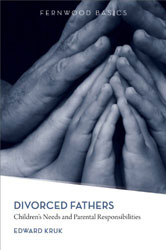Archivist and Researcher, University of Illinois
I was going to continue my inquiry into current myths about children, fathers and divorce, but while on vacation I read the latest book by Professor Edward Kruk, “Divorced Fathers: Children’s Needs and Parental Responsibilities.”
The results of his most recent study published in his book affirm much of what I postulated in my article, “The Urgency of Reform.” I found his study most fascinating and would like to share with you some of his findings on divorce rights for men.
The key theme of the book is discontinuity. Kruk is referring to significant discrepancies in how the court views things and the reality of its rulings.
Kruk also sees significant discrepancies in child custody and caretaking arrangements pre- and post- divorce. (Read related article “A Proposed Solution For How Child Custody Is Decided“)
According to Kruk, Canadian courts believe that they routinely award joint custody. However, it is in name only.
In the study, only 41% of fathers with joint custody also had parenting time with their children greater than 40% (page 69). Current research on the importance of parenting time sees a causal relationship between the quantity of parenting time and children’s wellbeing (see Fabricius et al, 2011). Legal joint custody is meaningless without the corresponding joint physical care.
The increasing role of fathers in direct childcare in two-parent homes has been documented, most recently by the Pew Research Center (2011). Kruk also makes reference to the convergence of gender roles (pages 31-32).
Despite this trend, only 29% of fathers who said that they substantially shared in childcare during marriage were allowed to continue to do so after divorce (page 70). And this was contrary to what 87% of these fathers wanted (Ibid).
As a result, Kruk sees the outcome for fathers and their children worse today than when he did in his 1989 study:
“It appears that more fathers are now engaged in shared-parenting in two-parent families, yet more fathers are becoming disengaged when removed as primary or co-caregiver” (page 72).
In 1989, Kruk saw that fathers who were highly involved with their children during marriage disengaged from their children after divorce at a rate over twice that of fathers who were more traditionally involved with their children during marriage.
In 1989, 48% of fathers studied were highly involved with their children during marriage. In 2011, 68% of fathers studied would fall under the same “highly involved” group (Ibid).
In the current study, 46% of fathers without shared parenting time disengaged from their children (page 69).
As I had speculated in “The Urgency of Reform,” Kruk “found that a strong pre-divorce father-child attachment bond predisposes fathers to deeper feelings of loss and a pronounced grief reaction after divorce” (page 71).
Regarding core themes that have emerged from the study the most interesting is what fathers consider most important to the wellbeing of their children, and the main issues facing divorced fathers.
The number one theme enumerated by fathers from their stories was the grief associated with their broken attachments with their children (page 73). The second salient theme focused on the Mothers’ discouragement of paternal contact. This was done via zealous gatekeeping, visitation interference or parental alienation.
Interestingly, out of eight themes identified financial losses ranked number six. Of the top three issues facing fathers, lack of access was mentioned by 54% of the fathers studied, whereas child support and other financial issues were indicated by 26% of the fathers (page 88).
This seems to contradict the myth that fathers only complain about their support obligations and are interested in contact only to reduce such obligations.
Kruk calls for an overhaul of a system currently “rooted in a framework of child custody determination that removes one parent as a primary caregiver, limits parenting options within a sole custody model and discriminates against children of divorce while perpetuating an adversarial approach to dispute resolution” (page 11).
Read Related Article: “A Proposed Solution For How Child Custody Is Decided“
 My name is Robert Ferrer. I am a researcher and archivist at the University of Illinois Urbana-Champaign. Although it is in Computer Science, I also apply the same heuristic principles in my interests in child development and family law. As such I’ve been working with the Children’s Rights Council of Illinois and Illinois Fathers in providing the background information in law and child development research for various endeavors. I have been collecting, reading and pondering the wealth of information dealing with divorce and children from many perspectives, including child development, family studies and law.
My name is Robert Ferrer. I am a researcher and archivist at the University of Illinois Urbana-Champaign. Although it is in Computer Science, I also apply the same heuristic principles in my interests in child development and family law. As such I’ve been working with the Children’s Rights Council of Illinois and Illinois Fathers in providing the background information in law and child development research for various endeavors. I have been collecting, reading and pondering the wealth of information dealing with divorce and children from many perspectives, including child development, family studies and law.
I’ve been attending the sessions of the Illinois Family Law Study Committee where they are currently reviewing current statutes for massive revisions. I’ve been in communications with many of its members and have established a collegial relationship. I have attended conferences on Contemporary Families, PAS and ADR. I have written several proposals in the attempt to mitigate parental loss, more fully integrating current research with proposed policy.


 By
By